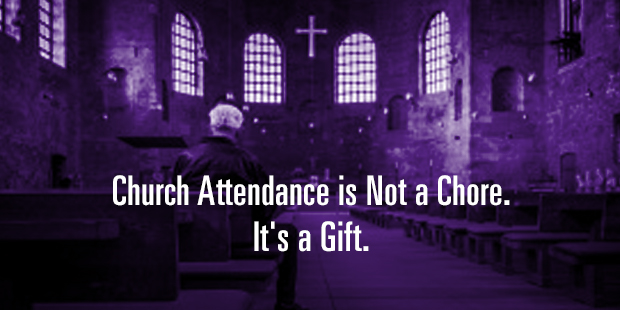
Church Attendance is Not a Chore. It’s a Gift.
A sparse sanctuary can discourage a pastor.
Surveys show that, in the past twenty years, the definition of a “faithfully attending church member” has fallen from three times a week to three times a month, resulting in sparser attendance in many evangelical churches, even if membership has climbed or plateaued.
Loving God, Loving His People
Church attendance came up in discussion with my small group recently, in a study on Joshua’s statement about his family choosing to “serve the Lord.” We asked the question: How do you cultivate in your family a love for God and a desire to gather with His people?
Some of the group members said you must do more than simply talk about the importance of gathering with God’s people; you’ve got to demonstrate that importance by the commitment and consistency you maintain as a family. Others mentioned how “forcing” your family to go to church, if it is done solely as a duty or as an obligation, can backfire and lead to resentment from your kids.
Writing at Christianity Today, Michelle Van Loon warns against using church attendance as a scorecard of faithfulness:
“When I hear a pastor talking about how true commitment and godly character requires being at church every week, I imagine him tapping his foot impatiently while holding a scorecard in one hand and a red Sharpie in the other.”
But while Michelle is right to say that “perfect attendance is not a reliable metric of one’s fidelity to Jesus,” gathering with God’s people is one of the primary ways we are reminded of Jesus’ fidelity to us.
That’s why we need to turn this conversation around. If you think of attending a worship service as merely a duty or an obligation that you are bound to fulfill, then you are speaking of worship as if it were a chore. Regular church attendance may feel like that at times, just as a daily “work out” sometimes does. But we’re off base if we regularly conceive of our weekly efforts to “meet together” and to “stir one another to love and good works” as merely an obligation.
Having To, Getting To
One of the dads in my small group said that he corrects his kids if they ever ask about having to go to church on a weekend. “We never have to,” he says, “we get to go.” I like that. He’s policing the language of the house because he knows that the way he talks about church will send a signal to the rest of the family about how to view Sundays – as chore or as privilege.
Here are three ways we should see gathering with God’s people as privilege:
1. Culturally
In some places, church attendance is regulated by the government. Unless you are registered, you cannot legally meet. Or you must meet in small numbers. Or you can meet, but are constantly afraid of what might happen. The news of church bombings across the world, often during worship services, is a frightening reminder of the high cost of meeting with other believers.
We have the privilege of living in a society where we are free to get to go to church. It is hard to imagine persecuted believers whose baptismal services are secret, dangerous affairs ever saying they have to go to church. Listen to the global church, and be renewed in your gratitude for the privilege of freely worshipping with believers.
2. Theologically
In some religions, adherents must fulfill elaborate rituals and sacrifices before gaining access to a holy space or the ability to appease the gods. Christianity, however, teaches that we have direct access to God because of the final, perfect sacrifice of Jesus Christ on our behalf. The gateway to God has been opened by Jesus, the Door.
Whenever we conceive of our praying and singing and listening to God’s Word as merely a duty or obligation, we forget that we are responding to a precious invitation. We have the privilege of speaking to and hearing from the King of the Universe. Do we have to meet with God Himself? Or do we get to address “our Father”?
3. Corporately
One of the reasons I love meeting with other believers is because I feel like I have a front-row seat at what God is doing in the lives of people around me. Over time, I see how God’s Word slowly transforms us into His image. I see how God brings people from different backgrounds and interests, different ethnicities and generations, and unifies them by the gospel without obliterating their differences, thus shining a spotlight on the goodness and grace of God from gloriously different angles.
We are not lonely pilgrims on individual journeys to glory; we are a community of faith, marching forward as exiles in this world, beloved by God and beloved by each other. It is a privilege to be part of each other’s lives, to cheer one another on in the faith, to chasten and chide with holy reverence when needed, and to love one another as Christ has loved us.
Conclusion
We do not go to church because of guilt. We are the church because of grace.
As Jonathan Leeman writes, we “gather to hear the Lord’s words, to affirm [our] accountability to it, and to extend its ministry in one another’s lives.” What an honor! Do we have to extend the ministry of God’s Word in the lives of others? Or do we get to see and show Jesus in the lives of our fellow church members?
Church attendance is not a chore. It’s a gift. Therefore, it should elicit gratitude, not griping.

Tags: Trevin Wax, church attendance, church attendance patterns, go to church












